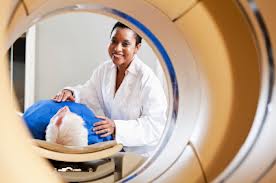
Clinical Radiology:
Clinical radiology focuses around the importance of imaging, especially its use for diagnosing and managing patient conditions, as well as the massive influence it has over the success of minimally invasive surgeries. As a clinical radiologist, you can be an integral member of many clinical teams and it also allows you to collaborate with many different specialities.
Many clinical radiologists have areas of expertise so clinical doctors will hunt out the relevant expert they need for their patient, with many radiologists focusing on specific organ systems instead of just concentrating on one form of imaging. Radiologists can contribute towards a more precise diagnosis and better informed management decisions.
Imaging includes many modalities including techniques which are not reliant on ionizing radiation such as ultrasound and MRI. Multislice CT scanners with Multiplanar reformats are indispensible to diagnosis. As the speed and resolution of CT images continues to increase many traditional studies are becoming obsolete. Positron emission tomography (PET) and molecular imaging have become central to the management of patients with cancer, their role in this and other diseases continue to evolve.
Clinical Oncology:
Clinical oncologists are involved in the management of all types of cancer. They work in tumour site specific multidisciplinary teams (MDTs) that focus on the non-surgical treatment of cancer affecting particular parts of the body or systems, and manage patients with cancer throughout their disease.
This would involve helping to form the treatment plan, using both radiology and systematic therapy, such as chemotherapy, hormone therapy and biological agents.
The clinical oncologist must be able to assess the relative merits of different cancer treatments for an individual patient and to explain these to the patient in a way that gives them the information required to make an informed decision about treatment options, whether they are looking for a cure or palliative treatment.

Clinical oncologists undergo training in the management of all types of cancer but increasingly concentrate on treating two or three types of cancer as a consultant. They work closely with surgeons, physicians, medical oncologists, haematologists, palliative care teams, cancer nurse specialists, radiologists and pathologists in the relevant MDT. They also work with radiologists, medical physicists and therapy radiographers to deliver radiotherapy, and with pharmacists and chemotherapy nurse specialists to deliver chemotherapy.
Clinical oncologists need to understand the scientific principles that underpin the treatment that they prescribe, including the pathology and biology of cancers, radiation physics, the pharmacology of systemic cancer therapies and statistics. As cancer treatment continues to advance rapidly, clinical oncologists are commonly involved in clinical research assessing cancer treatments. Some clinical oncologists pursue an academic career increasing understanding of how cancers behave or leading in clinical research too.


